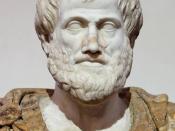Aristotle said that tragedy has six main elements; plot, character, thought, diction, melody, and spectacle. Aristotle felt that the action of the play (its plot) was the most important of the six elements. He said, "All human happiness or misery takes the form of action....Character gives us qualities, but it is in our actions--what we do--that we are happy or miserable."
There must be Unity of Plot. Any events or episodes must be necessary to the main issue and must also be probable or believable. A good plot has Peripety or Discovery--sometimes both. Peripety is the change from one state of things at the beginning of the play to the exact opposite state by the end of the play. This could be something like the change from being rich to being poor, or from being powerful to being powerless, or from being a ruler to being a beggar. The change that takes place in a tragedy should take the main character (and possibly other characters) from a state of happiness to a state of misery.
Discovery is a change from ignorance to knowledge. This often happens to the tragic hero who starts out "clueless" and slowly learns how he himself created the mess he ends up in at the end of the play.
Change by itself is not enough. The character involved in the change must have specific characteristics to arouse the tragic emotions of pity and fear. Therefore, Aristotle said that there are three forms of plot that should be avoided. A totally good man must not pass from happiness to misery. This will make the audience angry that bad things happened to him. They won't pity him as much as be angry for him. A bad man must not pass from misery to happiness. This won't appeal to...


